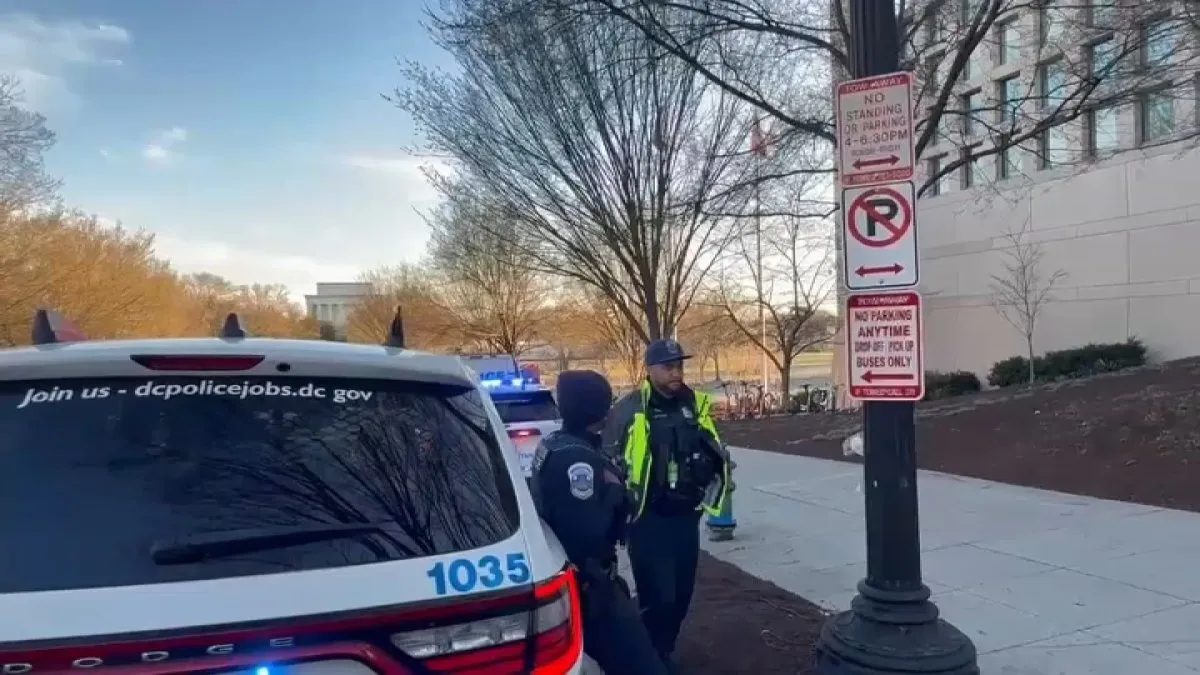
On Monday, the employees of Elon Musk's Department of Government Efficiency (DOGE) made headlines by entering the U.S. Institute of Peace (USIP), despite protests from the nonprofit organization, which asserts its status as an independent agency, not part of the executive branch. The CEO of USIP, George Moose, expressed his outrage, stating, "DOGE has broken into our building." Following the incident, USIP employees contacted the Metropolitan Police Department to report what they described as a break-in, prompting a police presence outside the USIP headquarters in Northwest D.C. on Monday evening.
This alleged intrusion occurred after the Trump administration dismissed most members of the USIP board and appointed a new leader to oversee operations at the independent organization. This move is part of a broader strategy targeting agencies involved in foreign assistance work. According to documents obtained by The Associated Press, the remaining board members—Defense Secretary Pete Hegseth, Secretary of State Marco Rubio, and National Defense University President Peter Garvin—terminated Moose's employment on Friday.
Established to further U.S. values in conflict resolution, the U.S. Institute of Peace is a congressionally funded nonprofit. The specific reasons for DOGE staffers' presence in the building remain unclear, as they reportedly attempted to gain access multiple times before succeeding on Monday. A sign was seen taped to the front door of the USIP headquarters on Tuesday, prominently displaying “Private Property” and “No Trespassing” in bold, red letters. In response to the ongoing situation, USIP employees were instructed to work from home until further notice.
Moose has indicated that discussions with D.C. police have been ongoing since President Donald Trump issued an executive order on February 19, asserting that the USIP headquarters is a private building endowed with the same rights as any other private property. Moose stated, “The employees of our building are not federal employees or executive branch employees. They are employees of the institute. We have our own, separate board; we have our own bypass authority to go directly to Congress in order to get our money.” Despite these arguments, Moose claims they have not been successful in asserting USIP's independence.
The DOGE workers managed to enter the building after several failed attempts and after being turned away on Friday. A senior USIP official, who chose to remain anonymous due to the sensitive nature of the situation, confirmed that DOGE staff were eventually granted access. Moose condemned the actions as an "illegal takeover" by elements of the executive branch, emphasizing that the USIP headquarters is not a federal building.
Moose remarked on the clear intent of the administration to dismantle what he refers to as foreign assistance programs, highlighting USIP's role within that framework. He described the DOGE staff's entry as both unlawful and inevitable, linking it to Trump's executive order aimed at reducing the size of the federal government. The administration has initiated efforts to remove and cancel programs at various organizations, including the U.S. Agency for International Development and other agencies like the Education Department.
White House spokesperson Anna Kelly cited USIP's alleged “noncompliance” with Trump's directive, stating that “11 board members were lawfully removed, and remaining board members appointed Kenneth Jackson as acting president.” She declared that “rogue bureaucrats will not be allowed to hold agencies hostage,” reinforcing the administration's commitment to enforcing executive authority.
Later on Monday, DOGE issued a statement via X, claiming Moose denied lawful access to Kenneth Jackson, the Acting USIP President. The statement indicated that the DC Police Department escorted Jackson into the building, asserting that the only unlawful actor was Moose, who allegedly attempted to terminate the private security team's contract when they sought to grant Jackson access.
DOGE's interest in USIP has been ongoing for weeks, though their attempts have been thwarted by legal arguments asserting the institute's protected status. On Friday, DOGE members, accompanied by two FBI agents, left after USIP's lawyer reiterated the organization's private and independent status. The chief of security, Colin O'Brien, confirmed that police assisted DOGE members in entering the building and stated that the private security team’s contract had been canceled.
The U.S. Institute of Peace positions itself as a nonpartisan, independent organization committed to protecting U.S. interests by preventing violent conflicts and facilitating peace agreements internationally. Established by Congress in 1984, USIP emphasizes its independence from the definitions of "government corporation" and "government-controlled corporation" outlined in U.S. Code.
In addition to USIP, the Trump administration has also targeted other organizations, such as the U.S. African Development Foundation and the Inter-American Foundation, as part of its broader strategy to reshape federal agencies. The outcome of these developments remains to be seen as legal battles continue and the implications for foreign assistance programs unfold.